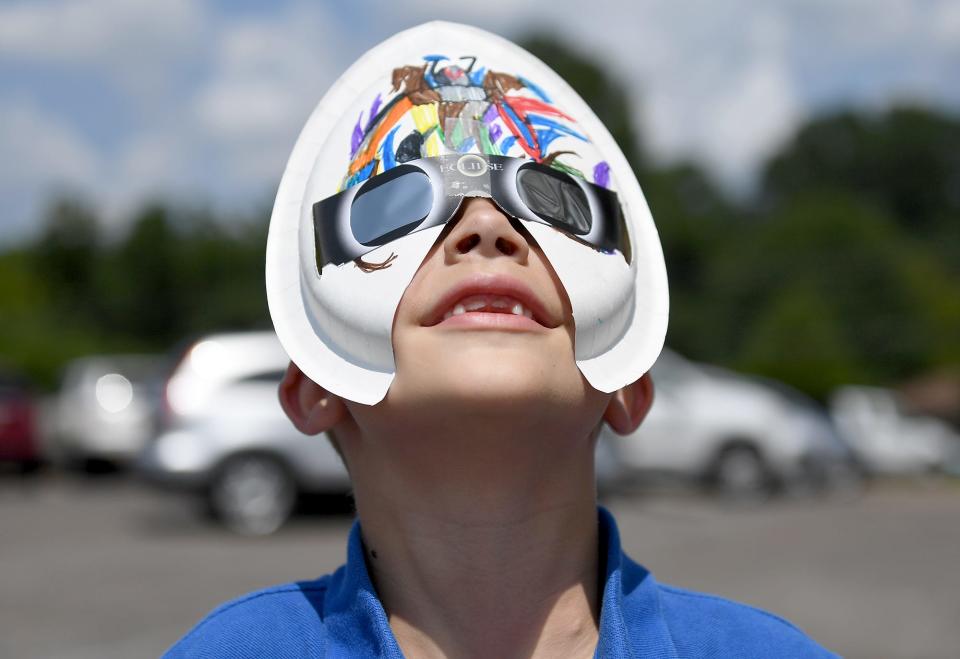Will we actually see the eclipse in Lansing on Monday? Well, yes, maybe
LANSING — Forecasters aren't making any promises, but things are looking up for that eclipse-watching thing next week.
"In southern Michigan, the trend is a little more favorable that we'll see some sunshine that afternoon," said Nathan Jeruzal, a meteorologist for the National Weather Service in Grand Rapids. "It does look like there is a chance people in Lansing could see the partial eclipse (on Monday)."
As we get closer to the Solar Eclipse on Monday, current trends favor at least some clouds in the area. The greatest cloud cover is favored across Central Michigan at this time. Some uncertainty still exists in the extent of clouds and should decrease over the coming days. pic.twitter.com/AKDtupeQfq
— NWS Grand Rapids (@NWSGrandRapids) April 4, 2024
Jeruzal noted that cloud cover is one of the more difficult things to predict, and any forecast this far in advance is "totally subject to change." But on Thursday afternoon, forecasters were "seeing some patterns evolve that could present a decent chance" the eclipse will be visible in mid-Michigan, he said.
In particular, it was looking like a system expected to bring some light rain to the region on Sunday night will be moving off to the east by the time the eclipse will be happening, he said.
MORE: Decoding the sky: A definitive solar eclipse guide for kids (adults also welcome)
In case you've been living under a rock and haven't heard by now, a total solar eclipse will happen Monday across a swath of the southern and central U.S., including a small slice of southeast Michigan. A total eclipse happens when the moon passes along a path that completely blocks the face of the sun. The sky becomes dark, and a few bright stars and planets become visible.
In Lansing, the moon will cover the majority − but not the entirety − of the sun at the peak of the eclipse. Here, the partial eclipse will begin around 1:56 p.m., reach a maximum at 3:12 p.m. and end about 4:25 p.m.
"We won't see the total eclipse from Lansing; it will be 96, 97% percent coverage," Shannon Schmoll, director of Abrams Planetarium at Michigan State University, told the State Journal last week. "We'll see a little crescent of sunlight still at that point. The whole event will be about 2½ hours long."

The path of totality will stretch from Mexico, across Texas, slanting northeast across the U.S. to Newfoundland, Canada. The path will be about 125 miles wide and will cross chunks of Illinois, Ohio, Pennsylvania, New York, Vermont, New Hampshire and Maine.
The next total solar eclipse in the contiguous United States won't happen until 2045.
The weather picture, in general, was looking pretty favorable for these parts going into next week.
A gradual warming trend should push temperatures into the 50s on Saturday and Sunday and into the low to mid-60s by Monday, with a shot at 70 degrees or so by mid-week, Jeruzal said.
The official forecast for Monday called for partly sunny skies, with a high of 63 degrees and a chance of showers, in the Lansing area.
If you're planning to watch the eclipse, you'll need proper equipment to avoid damaging your eyes. Here's what you'll need to know.
Contact Ken Palmer at kpalmer@lsj.com. Follow him on X @KBPalm_lsj.
This article originally appeared on Lansing State Journal: Will we actually see the eclipse in Lansing on Monday? Well, yes, maybe

